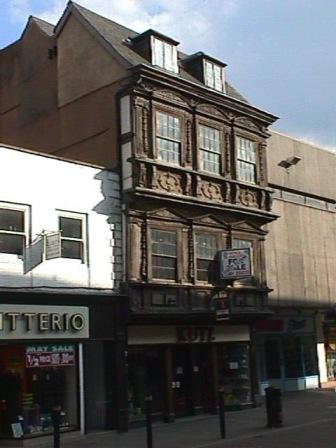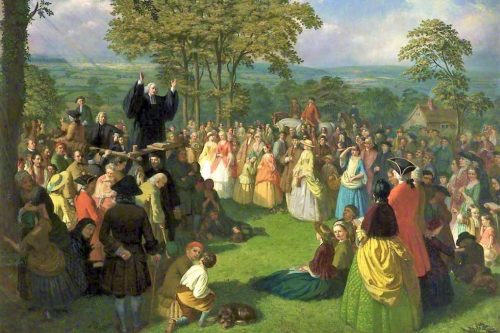Introduction
Most Christians are probably unfamiliar with this man. When asked ‘who was the greatest Preacher of all time?’, they might name Billy Graham or Charles Spurgeon. But until they came along, no one would have hesitated to name George Whitefield. Take a few minutes to read the Article below and become familiar with him.
(Following Material Courtesy Wikipedia)
George Whitefield (/ˈwɪtfiːld/; 27 December [O.S. 16 December] 1714 – 30 September 1770), also known as George Whitfield, was an Anglican cleric and evangelist who was one of the founders of Methodism and the evangelical movement.
Born in Gloucester, he matriculated at Pembroke College at the University of Oxford in 1732. There he joined the “Holy Club” and was introduced to the Wesley brothers, John and Charles, with whom he would work closely in his later ministry. Whitefield was ordained after receiving his Bachelor of Arts degree. He immediately began preaching, but he did not settle as the minister of any parish. Rather he became an itinerant preacher and evangelist. In 1740, Whitefield traveled to North America, where he preached a series of revivals that became part of the “Great Awakening”. His methods were controversial and he engaged in numerous debates and disputes with other clergymen.

Whitefield received widespread recognition during his ministry; he preached at least 18,000 times to perhaps 10 million listeners in Great Britain and her American colonies. Whitefield could enthrall large audiences through a potent combination of drama, religious rhetoric, and patriotism.
In 1740, Whitefield traveled to North America, where he preached a series of revivals that became part of the “Great Awakening“. His methods were controversial and he engaged in numerous debates and disputes with other clergymen.

Early Life
Whitefield was born on 27 December [O.S. 16 December] 1714 at the Bell Inn, Southgate Street, Gloucester in England. Whitefield was the fifth son (seventh and last child) of Thomas Whitefield and Elizabeth Edwards, who kept an inn at Gloucester. At an early age, he found that he had a passion and talent for acting in the theatre, a passion that he would carry on with the very theatrical re-enactments of Bible stories he told during his sermons. He was educated at The Crypt School, Gloucester, and Pembroke College, Oxford.
Because business at the inn had diminished, Whitefield did not have the means to pay for his tuition. He therefore came up to the University of Oxford as a servitor, the lowest rank of undergraduates. Granted free tuition, he acted as a servant to Fellows and Fellow-commoners; duties including teaching them in the morning, helping them bathe, cleaning their rooms, carrying their books, and assisting them with work. He was a part of the “Holy Club” at the University with the Wesley brothers, John and Charles. An illness, as well as Henry Scougal’s The Life of God in the Soul of Man, influenced him to turn to the Church. Following a religious conversion, he became passionate for preaching his new-found faith. The Bishop of Gloucester ordained him a deacon.
Evangelism
Whitefield preached his first sermon at St Mary de Crypt Church in his home town of Gloucester, a week after his ordination. He had earlier become the leader of the Holy Club at Oxford when the Wesley brothers departed for Georgia.
In 1738 he went to Savannah, Georgia, in the American colonies, as parish priest of Christ Church. While there he decided that one of the great needs of the area was an orphan house. He decided this would be his life’s work. He returned to England to raise funds, as well as to receive priest’s orders. While preparing for his return, he preached to large congregations. At the suggestion of friends he preached to the miners of Kingswood, outside Bristol, in the open air. Because he was returning to Georgia he invited John Wesley to take over his Bristol congregations, and to preach in the open air for the first time at Kingswood and then at Blackheath, London.

Whitefield accepted the Church of England’s doctrine of predestination and disagreed with the Wesley brothers’ Arminian views on the doctrine of the atonement. As a result, Whitefield did what his friends hoped he would not do—hand over the entire ministry to John Wesley. Whitefield formed and was the president of the first Methodist conference, but he soon relinquished the position to concentrate on evangelical work.
Three churches were established in England in his name—one in Penn Street, Bristol, and two in London, in Moorfields and in Tottenham Court Road—all three of which became known by the name of “Whitefield’s Tabernacle”. The society meeting at the second Kingswood School at Kingswood, a town on the eastern edge of Bristol, was eventually also named Whitefield’s Tabernacle.
Whitefield acted as chaplain to Selina, Countess of Huntingdon, and some of his followers joined the Countess of Huntingdon’s Connexion, whose chapels were built by Selina, where a form of Calvinistic Methodism similar to Whitefield’s was taught. Many of Selina’s chapels were built in the English and Welsh counties. One was erected in London—Spa Fields Chapel.
In 1739, Whitefield returned to England to raise funds to establish the Bethesda Orphanage, now the Bethesda Academy. It is the oldest extant charity in North America.
